Course Number
VMCC-2521
Date
June 15, 2025 - June 22, 2025
Boundary Waters Canoe Area Wilderness (BWCAW)
Over 10,000 years ago, continental-sized glaciers scraped their way across much of Ontario and northern Minnesota leaving deep ruts, ravines, and holes in their tracks. Eventually, as the glaciers melted, these ravines filled with water, creating a seemingly endless interconnected web of lakes and rivers.
In 1978, the United States designated over 1-million acres of this Northern Minnesota landscape as a protected wilderness area called the Boundary Waters Canoe Area Wilderness (BWCAW). Because no roads, power lines, or motorized craft may enter its borders, the BWCAW has remained relatively unchanged since the glaciers receded. The BWCAW extends nearly 150 miles along the Canadian border and encompasses more than 1,000 lakes and rivers. Over 1,200 miles of navigable routes lead to over 2,200 campsites and provide an unparalleled opportunity to travel by canoe and dogsled.
In the winter, the BWCAW transforms into an even more severe and remote wilderness. While more difficult, winter enthusiasts’ travel over frozen lakes and rivers by dogsled, cross-country ski and snowshoe. Winter in the Boundary Waters is mesmerizing, peaceful, and exhilarating. It is a place of spectacular extremes, trackless snow, bracing cold air, glowing warm embers, and powerful silence.
Homeplace, Voyageur Outward Bound School Basecamp, Minnesota
Homeplace is located at the edge of the Boundary Waters Canoe Area Wilderness in northern Minnesota. Situated where the Kawishiwi River meets Birch Lake in the Superior National Forest, the Voyageur Outward Bound School basecamp provides an ideal location for launching/ending BWCAW paddling and dogsledding trips, and practicing white water paddling skills. The surrounding boreal forest also makes Homeplace a great location for spotting moose, wolves, beavers, deer, woodpeckers, eagles and black bear.
Portaging – Groups work as a team to carry packs and canoes over portage trails when transitioning from one lake to another or around challenging rapids. Portage trails are rugged and often rocky or hilly. They vary in length from 10 yards to a mile or longer. Pack weights also vary depending on the length of the trip, and how much personal equipment each group member brings along. Personal packs weigh at least 40 pounds and sometimes considerably more. Food and equipment packs usually weigh between 50 and 70 pounds. Each canoe is outfitted with shoulder pads on the center thwart, and when turned upside down, can be carried on one person’s shoulders. Canoes weigh 75 pounds.
Rock Climbing – At one or two different points during the expedition, students have the opportunity to climb at a stunning, outdoor rock climbing site. Outward Bound chooses rock climbing sites that provide a number of different route options including cracks, sheer faces, and chimneys. Regardless of a student’s rock climbing background, everyone is sure to find something that will both challenge and encourage them. All Outward Bound rock climbing experiences are heavily supervised and employ safety systems that are compliant with national standards.
During climbing days, students learn about general rock-climbing equipment, safety and etiquette before practicing how to belay. Students have many opportunities to climb, belay, and rappel throughout the day. Rappelling involves stepping over the edge and controlling one’s own descent.
Solo – Weather and time permitting, an Outward Bound Solo experience provides an important break from the rigors of the expedition and gives students the opportunity to reflect on their Outward Bound experience. The duration of Solo depends on the course length and type as well as the competency and preparedness of the student group. Students on a 3-week course typically spend 2-nights on Solo while students on a 1-week course may spend one night or even just a few hours on Solo. Regardless of Solo length, all students receive sufficient food, water, and shelter to keep them safe and healthy during Solo. Instructors choose Solo sites to offer as much solitude as possible while retaining some proximity to the whole group. While students spend the majority of their Solo time alone, Instructors do check on each student as often as needed, usually 1-4 times per day, to ensure that each student feels safe and comfortable. Instructors work with each student individually to structure a successful, unique Solo experience that meets their specific needs. Solo is purposefully scheduled near the end of the expedition so students have plenty of time to acclimate to their new environments beforehand.
Students often have mixed feelings leading up to Solo. Inevitably, students feel some nervousness and hesitation but are also excited to rest, reflect and test their new skills after spending many days in the wilderness. Students often find that Solo provokes profound and powerful learning in a short period of time and Solo often becomes one of the most memorable parts of their Outward Bound experience.
Final Expedition – Outward Bound believes that an appropriate amount of independence is a powerful educational tool. In order to deliver that benefit, Outward Bound purposefully and gradually transfers certain leadership responsibilities to the students culminating with our “Final Expedition.” Near the end of course, if you and your group have demonstrated the necessary leadership, team problem-solving and wilderness living skills, you may be given the opportunity to travel without your instructors immediately present. Students on courses designed for ages 16 and older may travel without instructors immediately present (although they will be near the group for safety reasons) for one to five days depending on course length, student age, staff assessment of students’ abilities, and terrain. Many of our students feel this phase of the course is the most rewarding as the group learns to work together, problem solve, and accomplish a goal independently while utilizing all the skills they have acquired.
High Ropes Course – The Voyageur Outward Bound School High Ropes Course is an incredible obstacle course set 30-feet in the air. Students look out over the top of the boreal forest as they swing from Tarzan ropes, walk on a tight-rope wires, and climb a cargo net before jumping off the zip line for a smooth ride back to solid ground. Most groups have an opportunity to test their nerve on the ropes course if their course incorporates a short stay at the Outward Bound basecamp, usually before or after their field expedition.
Canoeing – It’s possible to canoe to the Pacific, Arctic and Atlantic oceans from the Voyageur Outward Bound School basecamp in land-locked northern Minnesota. These journeys, which take anywhere from 3 months or longer, always begin in northern Minnesota’s Boundary Waters Canoe Area Wilderness (BWCAW); a million-acre protected expanse of interconnected lakes and rivers. It is also one of the most historically significant and remote wilderness areas in North America.
Because all Voyageur Outward Bound School canoeing courses are un-resupplied, groups paddle with absolutely everything they will need for their entire expedition, allowing students to journey deep into the wilderness. This type of extended wilderness experience, along with our highly-trained Instructors, help students develop and refine new expedition skills, cultivate a deep connection with the environment, form meaningful friendships, and develop a better understanding themselves through challenge and discovery.
During a Voyageur Outward Bound School canoeing expedition, students learn a variety of paddling skills to contend with diverse weather and waterway conditions as they canoe from campsite to campsite. Wind speeds tend to increase around noon and sometimes remain strong throughout the day. For this reason, groups will often rise early to take advantage of flat waters in the morning and then enjoy a longer lunch break as they wait for the windiest part of the day to pass. Paddling partners work together to steer and power their boats through rivers, swamps and lakes, usually traveling between 8 and 20 miles a day. Students also learn how to portage, navigate with a map and compass, cook over a fire or stove, and employ Leave No Trace® wilderness ethics.
Course End – All courses end with a shower, graduation ceremony and celebration dinner. Shower facilities are available at the basecamp.
The following is an example of what your course itinerary may look like. Your actual itinerary will vary according to weather, student skills and abilities, and instructor preferences.
Day 1: The course begins at the Duluth Airport before transporting to your first campsite near the Voyageur Outward Bound School basecamp in northern MN. Meet your Outward Bound Instructors, organize your equipment, eat dinner and sleep in tents.
Day 2: Participate in a half-day of rock climbing at a stunning outdoor rock climbing site before entering the Boundary Waters Canoe Area Wilderness to begin the expedition. Learn to paddle and portage a canoe, set up camp, and cook over a fire. Travel until it’s time to set up camp each night.
Days 3-4: Continue paddling and portaging from campsite to campsite as you refine your wilderness skills and get to know your group.
Day 5: Experience Solo. Take time to rest and reflect at your own little campsite on the shore of a lake. You will not travel during this time and your Instructors will check on you occasionally.
Day 6: Travel back to the Voyageur Outward Bound School basecamp. Clean your expedition equipment, experience the high ropes course, and enjoy sleeping in a bunkhouse.
Day 7: Shower and attend a graduation ceremony before enjoying a final banquet celebration.
Day 8: Eat an early breakfast and depart for the airport to travel home.
In addition to the expedition itself and all of the skills and learning associated with it, Outward Bound’s time-tested curriculum includes education on the many aspects of personal growth and learning that can be found in each activity you undertake. You will learn four important Outward Bound Core Values:
- Compassion
- Integrity
- Excellence
- Inclusion and Diversity
You may find that the most important lessons you take home are learning about yourself and your community while acquiring backcountry skills and having an adventure.You’ll learn to protect and appreciate the unique, unspoiled environments through which you travel.
Successful completion of your course demands mastery of skills, trust, fitness, confidence, tenacity, leadership, initiative and compassion. The promotion of these qualities and the discovery of what’s in you is the purpose of Outward Bound.
Weather is always a factor when traveling in the wilderness and it adds an exciting element of challenge to each course. Learning to handle varying weather conditions is essential to a successful wilderness course.
Minnesota’s weather can be unpredictable with a wide range of temperatures. In the summer the temperature tends to stay between 60 and 85 degrees. Summer brings occasional thunderstorms and rain showers. Expect cooler evenings, misty mornings, occasional rainstorms, and hot days perfect for swimming.
Please utilize the resource below to physically and mentally prepare for your course. The more preparation you do, the better your experience will be!
Your full tuition payment is due by the deadline in your applicant portal. Please make your payment by that deadline.
We hope you look forward to your Outward Bound course! Now let us help you protect your investment. We partner with InsureMyTrip to offer our students a travel insurance option that will help protect your course from several different disruptions. Together Outward Bound and InsureMyTrip will be here for you before, during, and after your trip. We strongly recommend that you purchase trip insurance to protect your investment in your course. Voyageur Outward Bound School tuition is non-refundable.
You may choose to purchase trip related insurance through InsureMyTrip or a different insurance provider. In either case, the amount and type of coverage you choose is your responsibility and must be discussed directly with the provider.
CLICK HERE TO RECEIVE A FREE QUOTE FROM INSURE MY TRIP
You can find additional information about InsureMyTrip in the cancellation policies.
Camp & Shelter Setup for Spring, Summer, and Fall Courses:
Campsites in the Boundary Waters Canoe Area Wilderness, the St. Croix River, and on the Superior Hiking Trail contain tent sites, fire grates, and pit toilets. After arriving at your campsite in the evening, you'll care for your feet, gather lots of firewood, and set up tents for sleeping in and tarps for sheltering gear and yourselves in inclement weather. You'll cook your food over an open fire and gather for evening meetings. On St. Croix courses you may cook over a camp stove instead of a fire. 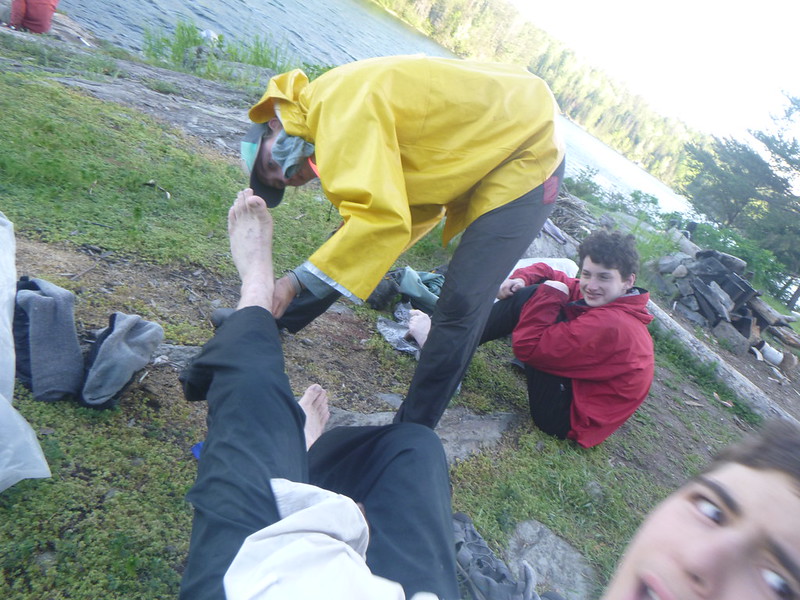
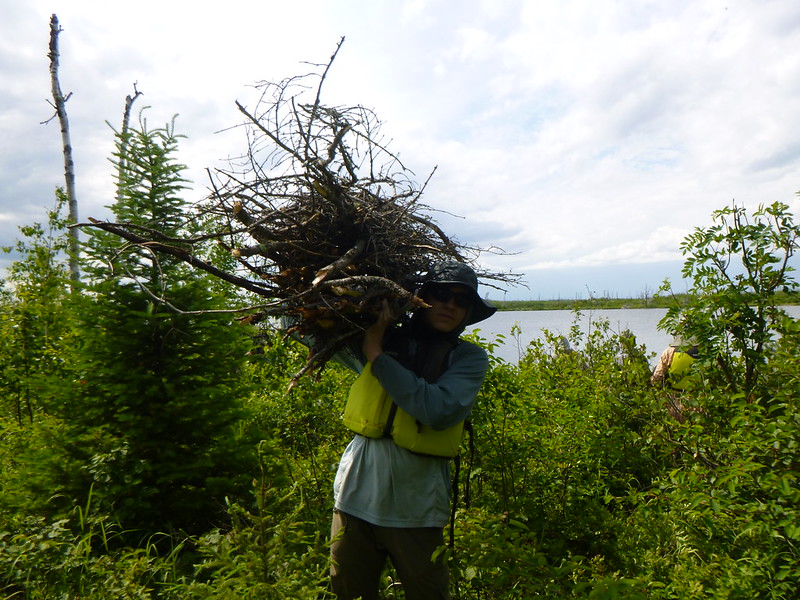
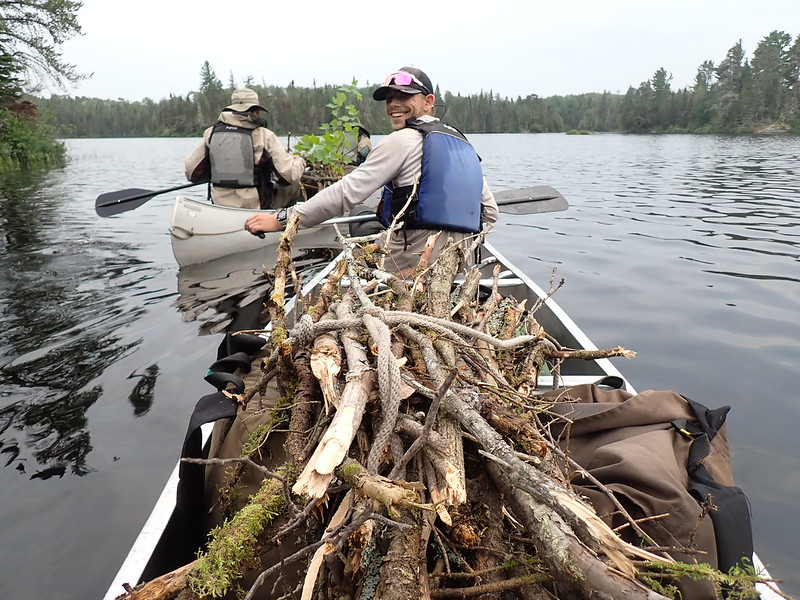
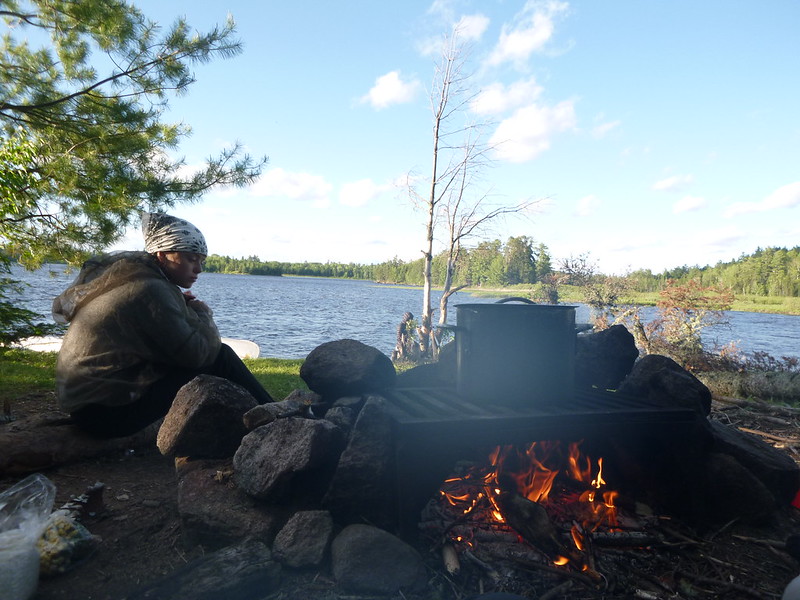
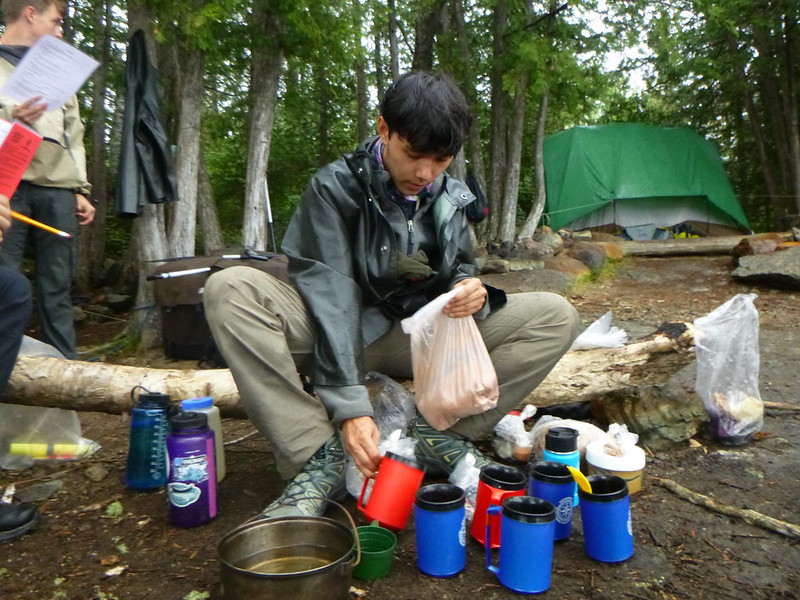
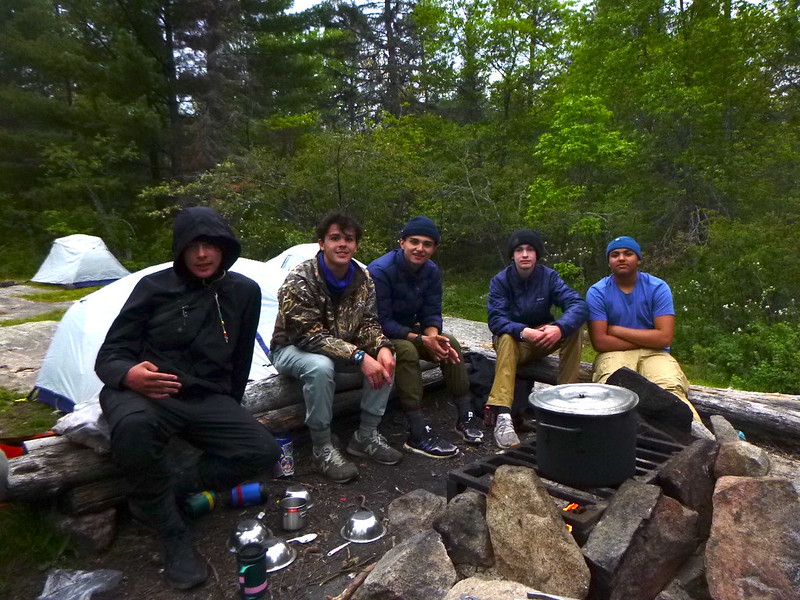
Preparing and eating tasty meals in the backcountry is part of the Outward Bound experience.
Under your instructors' supervision, you and your crew will prepare group meals in a camp setting over an open fire on a US Forest Service firegrate. Meals are eaten as a group and may start off with group announcements, appreciations, or an inspirational quote. We use this time together to reflect on the successes and challenges of the day and to plan what is to come for the following day.
Your group will travel with all the food you need for your expedition. For some longer courses, our support staff meet up with your group in the wilderness to restock your food. This meet up is called a “re-supply.”
Our courses are physically rigorous, and our meals emphasize protein and carbohydrates to re-fuel your body. All course food is packable and non-perishable. We use a mix of dehydrated foods, fresh fruits, and vegetables. Our goal is to provide meals that are familiar. However, we ask that you be open to trying foods that may be new to you.
Participants should not bring their own food or snacks unless authorized to do so by your Course Advisor.
Our Food Pack Out Process
All meals at Outward Bound are cooked outdoors in remote camp settings. We work diligently to provide familiar and tasty foods, and we acknowledge that our food options are limited while we are on expedition, away from our supply facilities.
We depend on clear and accurate food allergy and dietary restrictions disclosed during the admission process to adequately plan and pack your group’s meals and snacks before your course start. Our processes are not designed to accommodate last minute dietary requests or to loosen dietary restrictions originally disclosed.
Dietary Restriction Options
- We can accommodate vegetarian, vegan, gluten-free, soy-free, nut-free, and various other dietary restrictions
- Soy Milk (Oat milk for those with soy allergies)
- Sunflower butter and nut-free trail mix for those with nut allergies
- Beans and hummus for vegetarians and dairy-free/vegan options
- Gluten-free noodles and oats (all our granola is gluten-free)
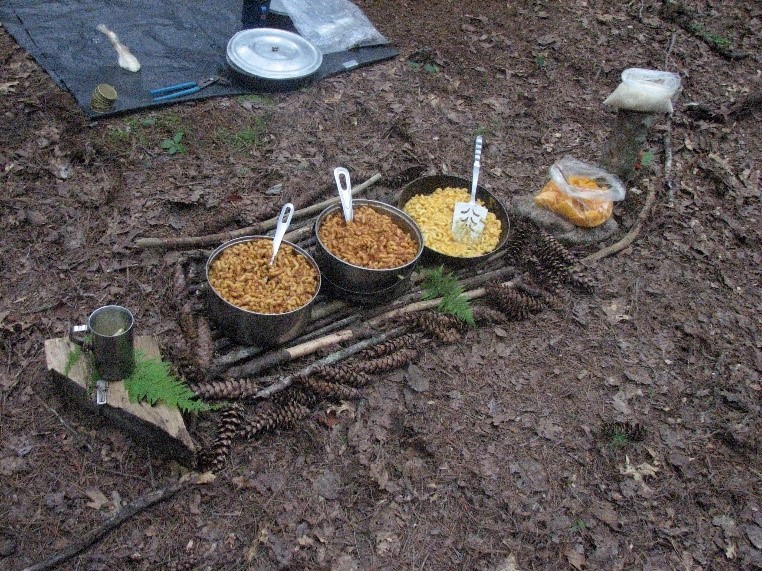
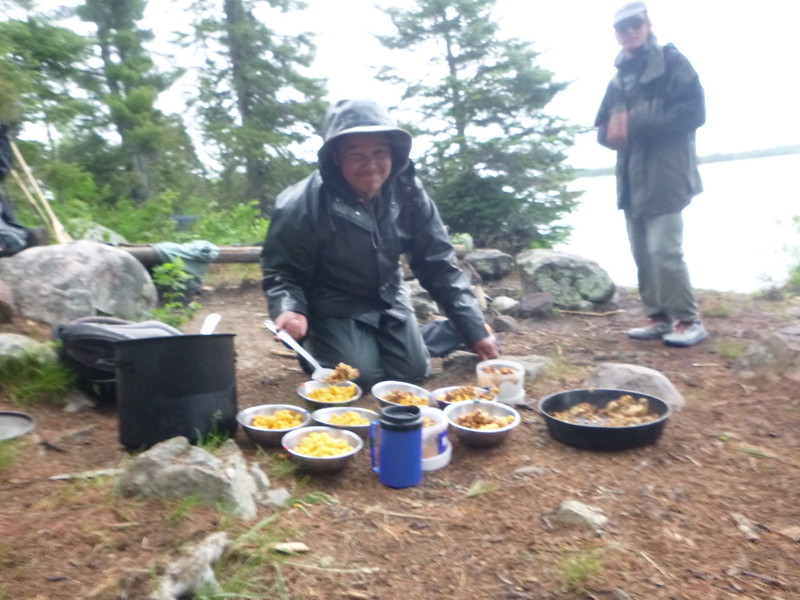
MEALS AT OUTWARD BOUND
The following list represents common meals at Voyageur Outward Bound (this is not a menu)
Breakfasts
- Granola (locally made in Ely, MN) with milk (powder)
- Oatmeal with fixins’ (raisins, pumpkin seeds, cinnamon, sugar)
- Cheesy Grits
- Grape Nuts cereal with Milk (optional: add honey or vanilla pudding powder)
Lunch
- Bagels and cream cheese
- Pepperoni or Summer Sausage with cheese on tortillas
- PB&J Tortillas
- Hummus & Tuna & Crackers
- Bean and Cheese Burrito
- Extras: Trail mix (GORP)/ Dried Fruit
Dinner
- Refried Beans and Rice with peppers and fresh salsa
- Spaghetti: Noodles with tomato sauce and veggies
- Pesto Pasta
- Peanut Noodle Stir Fry
- Voyageur Stew: lentils, rice, potatoes, carrots, and cabbage with a side of biscuits
- Chili and Cornbread
- Macaroni and Cheese
- Chili Mac
- Curry with potatoes, lentils, and carrots
Snacks & Extras
- Apples
- Dried Fruits
- Trail Mixes
- Flappers (homemade “granola bars”)
- Chocolate Cake
- Brownies
- Cornbread
- Biscuits
- Bread
Drinks
- Tea (both bags and house-made chai mix)
- Cocoa
- Coffee
- Drink Mixes (Lemon-Lime and Orange)
Here are some books that we encourage you to read as you plan for your course:
- The Outward Bound Wilderness First-Aid Handbook by Jeff Isaac
- Leave No Trace: A Practical Guide to the New Wilderness Ethic by Annette McGivney
- Knots & Ropes for Climbers by Duane Raleigh and Mike Clelland
- The Outward Bound Backpacker's Handbook by Glenn Randall
- The Outward Bound Map & Compass Handbook by Glenn Randall
Boundary Waters Canoe Area Wilderness:
- A Boundary Waters History: Canoeing Across Time by Stephen Wilbers
- Magic on the Rocks: Canoe Country Pictographs by Michael Furtman
- Canoe Country Flora: Plants and Trees of the North Woods and Boundary Waters by Mark Stensaas
- Reflections from the North Country by Sigurd Olson
- Talking Sky: Ojibwe Constellations as a Reflection of Life on the Land by Carl Gawboy
- Talking Rocks: Geology and 10.000 Years of Native American Tradition in the Lake Superior Region by Carl Gawboy
- Root Beer Lady: The Story of Dorothy Molter by Bob Cary
Winter Dogsledding courses:
- Cold Nights, Fast Trails: Reflections of a Modern Dog Musher by Dave Olesen
- Winterdance: The Fine Madness of Running the Iditarod by Gary Paulsen
Website Resources:
Piragis Northwoods Company: BWCAW Resouces and books
Maintaining personal hygiene in the wilderness is important and is taught on every course. You will be outside while on course and won't have access to a shower or bath. You will be able to do basic cleanup every day: brush your teeth, wash your face and comb your hair. At the end of your course, you will be able to do a more thorough cleanup.
As the Voyageur Outward Bound School is an outdoor program, you can expect to learn and use Leave No Trace camping techniques. Know that it is natural to have questions regarding sanitation in an outdoor setting. Your instructors will answer your questions and will teach you the hygienic and environmentally safe way to dispose of waste as well as techniques for basic cleanliness - don't hesitate to approach them with any questions or concerns